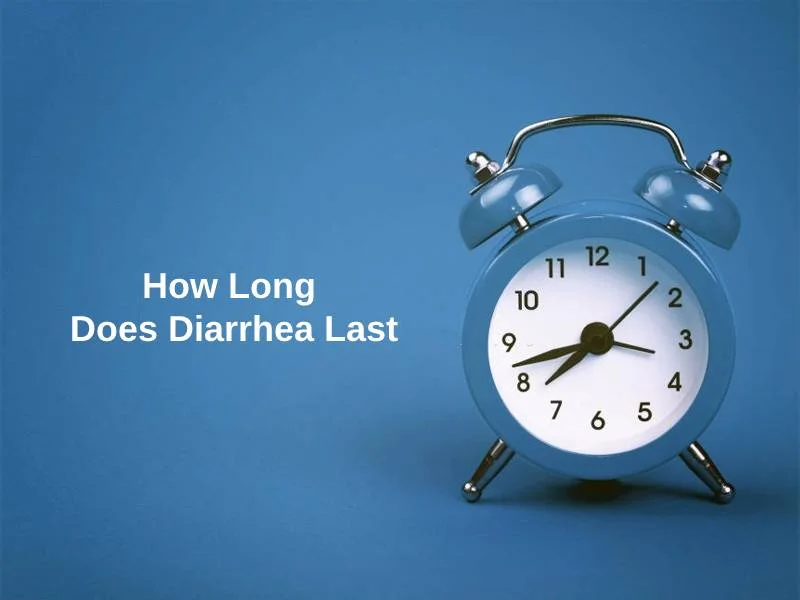Exact Answer: 2 Days To 4 Weeks
Diarrhea refers to frequent, loose, and watery bowel movements. Bowel movements, also called stools, are body wastes that are passed out from one’s body. They contain what is left after the digestive system absorbs nutrients and fluid from foods and drinks that one consumes.
It is caused by a virus called viral gastroenteritis or sometimes by contaminated food. Less frequently, it can be a sign of another disorder such as inflammatory bowel disease or irritable bowel syndrome.
Diarrhea may be acute (short term), persistent, or chronic (long term) according to the duration it lasts in one’s body.

How Long Does Diarrhea Last?
| Type Of Diarrhea | Duration |
| Acute diarrhea | 1 – 2 days |
| Persistent diarrhea | 2 – 4 weeks |
| Chronic diarrhea | 4 weeks or more |
Diarrhea is a common problem. Acute diarrhea is more common than persistent or chronic diarrhea. Acute diarrhea lasts for a few days. It is mild and resolves on its own. However, chronic diarrhea can last for at least 4 weeks or more. The symptoms might come and go, but it could be a sign of a serious health condition.
Most diarrhea goes away on its own in a few days. When diarrhea lasts for longer durations, tests are needed to find out what is causing it, to administer its proper treatment.
Some of the major complications of diarrhea include dehydration and malabsorption. Due to frequent bowel movements, the body lacks enough fluid and electrolytes to work properly and efficiently. Malabsorption is a condition wherein people do not absorb enough nutrients from the food they eat, making them susceptible to malnourishment. Conditions that can cause chronic diarrhea such as infection, food allergies, and intolerances, etc can cause malabsorption.
Diarrhea is not an urgent medical problem. However, dehydration can be life-threatening. It is especially dangerous in infants, young children, old people, and people with a weakened immune system.
Why Does Diarrhea Last This Long?
Diarrhea is the medical term for passing loose, watery tools at least three times a day. Both short-term and long-term diarrhea have different causes and may consequently require specific treatment.
Acute diarrhea occurs due to viruses and viral infections. These infections tend to clear up on their own within a few days. Its symptoms include nausea and vomiting, stomach ache, headache, chills, and fever. Persistent diarrhea can occur as a result of viral, bacterial, or parasitical infections. Conditions that cause acute diarrhea might sometimes trigger persistent diarrhea.
Without treatment, certain bacterial and parasitic infections might cause chronic diarrhea. It can indicate an underlying food allergy or intolerance which has caused an upset stomach and diarrhea. Other causes include irritable bowel movement, celiac disease, small intestinal bacterial overgrowth, inflammatory bowel diseases such as ulcerative colitis and Crohn’s disease.
Although most cases of diarrhea are self-limited, sometimes it can lead to serious complications. When the body losses large amounts of water it causes dehydration, electrolyte imbalances wherein there is loss of sodium, potassium, and magnesium that play a key role in vital bodily functions, and kidney failure when enough blood or water is not supplied to the kidneys.
One must immediately consult a doctor if diarrhea persists beyond 2 days with no improvement or when one has severe abdominal pain with a fever above 102 degrees F i.e. 39 degrees C. One must drink plenty of water to replace the water that gets lost when one is suffering from diarrhea.
Conclusion
Acute diarrhea can last anywhere from 2 days to 2 weeks. This form of diarrhea is mild and gets better with home remedies. If it lasts longer than 2 weeks but less than 4 weeks, it is called persistent diarrhea. Chronic diarrhea, on the other hand, may last for 4 weeks or more. It is indicated an underlying health condition like irritable bowel movement etc.
Most cases of short-term diarrhea are not concerning. However, if diarrhea does not get better, or one has signs of dehydration, fever, bloody stools, or severe pain, it is important to get medical care as soon as possible.
References
- https://tdtmvjournal.biomedcentral.com/articles/10.1186/s40794-018-0077-1
- https://www.tandfonline.com/doi/full/10.1586/egh.09.49
- https://www.researchgate.net/profile/Shan-Putnam/publication/7093052_Incidence_Etiology_and_Impact_of_Diarrhea_among_long-term_travelers_US_Military_and_Similar_Populations_A_Systematic_Review/links/09e4150d4079dbe5cd000000/Incidence-Etiology-and-Impact-of-Diarrhea-among-long-term-travelers-US-Military-and-Similar-Populations-A-Systematic-Review.pdf